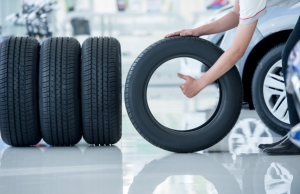No matter how responsive the handling, how powerful the engine, or how up-to-date the safety tech is, if your vehicle’s tires are in poor condition then you won’t just undermine your driving experience; you’ll put your car and yourself at serious risk. Here are some of the signs that it’s time to contact your GMC dealer about new tires.

Worn Treads
The grooves on your tires that help it to grip the road are called treads, but over time they become shallow as they wear away. Worn or “bald” tires are more likely to get punctures. They’re also less effective at channeling away the water under the wheel, making you more likely to lose traction on a wet road. This increases the likelihood of an accident and should be attended to as soon as possible.
To evaluate your tires, try inserting a penny coin into the treads with Lincoln’s head pointing towards the center. If the treads are more than 1.6mm deep, they will obscure the head. If they don’t, they are becoming worn and unsafe. Alternatively, you could look at the tread wear bars. These are horizontal lines that run between the tread blocks. They become flush to the treads as the tires wear away.
Bulges and Damage
Tire damage is often visible to the naked eye, so it’s a good idea to perform regular visual checks. Bulges in the tire mean that the inner lining has been broken and puts your car at risk of a blowout. Also, look out for cuts or cracks in the tire’s surface or places where the tire fabric is showing through the rubber. Uneven tire wear can also be a sign of trouble.
Underinflated Tires
Tires are filled with air, but this can escape for a number of reasons. These include wear and tear or old age, structural problems such as a bent rim, a slow puncture, or other damage. Underinflated tires mean longer stopping distances, poorer fuel economy, and clumsy steering, so they’ll undermine your car’s performance. They also put your vehicle at more risk of a blowout.
The figures for the optimal PSI for your car’s tires are shown on the driver’s door jamb, and it’s a good idea to check your tire pressure regularly. Changing temperatures can affect the air density inside, but this can be solved by simply pumping the tire back up. On the other hand, tires that are chronically underinflated will need to be replaced.
It’s vital to be proactive about looking after your tires for the safest and most enjoyable driving experience. For the very best support in keeping your vehicle in top-notch condition, schedule a service at Finley Buick GMC and take advantage of our practical knowledge and skills.

